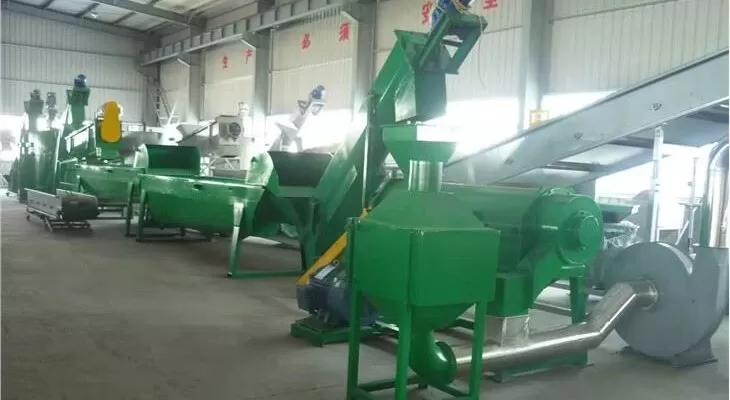Plastic waste is an ever-growing problem. It’s clogging our oceans, filling our landfills, and threatening wildlife. To combat this, the U.S. has implemented various environmental policies aimed at reducing plastic waste and promoting recycling. But how effective are these policies? And what impact do they have on the plastic recycling industry?

U.S. environmental policies play a crucial role in shaping the plastic recycling landscape. These policies are designed to reduce plastic waste, increase recycling rates, and promote sustainable practices. By understanding these policies, we can better navigate the challenges and opportunities they present.
Let’s explore how these policies influence the plastic recycling industry.
What Are the Key Environmental Policies in the U.S.?
The U.S. has implemented several key policies to address plastic waste. These include:
- The Resource Conservation and Recovery Act (RCRA): This act governs the disposal of solid and hazardous waste, including plastics. It encourages recycling and proper waste management.
- The Plastic Waste Reduction and Recycling Act: This recent legislation aims to reduce plastic waste through improved recycling infrastructure and research into alternative materials.
These policies are designed to tackle plastic waste at various stages of its lifecycle, from production to disposal.
How Do These Policies Impact Plastic Recycling?
Environmental policies impact plastic recycling in several ways:
- Increased Recycling Rates: Policies like RCRA encourage businesses and consumers to recycle more. This leads to higher recycling rates and less plastic waste in landfills.
- Investment in Recycling Infrastructure: The Plastic Waste Reduction and Recycling Act provides funding for recycling facilities and technologies. This improves the efficiency and capacity of recycling operations.
- Research and Development: Policies promote R&D into new recycling technologies and alternative materials. This leads to innovations that make recycling more effective and less costly.
What Are the Challenges Faced?
Despite the positive impact of these policies, the plastic recycling industry faces several challenges:
- High Costs: Setting up and maintaining recycling facilities is expensive. Policies often provide funding, but it’s not always enough to cover all costs.
- Market Fluctuations: The market for recycled plastics can be unstable. Prices for recycled materials can fluctuate, making it difficult for recycling businesses to stay profitable.
- Consumer Behavior: Policies encourage recycling, but changing consumer behavior is a slow process. Many people still do not recycle properly, leading to contamination and inefficiencies in recycling operations.
How Can We Overcome These Challenges?
To overcome these challenges, the industry must:
- Increase Public Awareness: Education campaigns can help inform the public about the importance of recycling and proper waste disposal. This can lead to better recycling habits.
- Innovate: Continued investment in R&D can lead to new technologies that make recycling more efficient and cost-effective. Innovations in sorting and processing technologies can reduce costs and improve the quality of recycled materials.
- Policy Support: Continued support from policymakers is crucial. This includes funding for infrastructure, incentives for businesses, and regulations that encourage sustainable practices.
What Are the Future Trends?
Looking ahead, several trends are likely to shape the future of plastic recycling in the U.S.:
- Circular Economy: There is a growing push towards a circular economy, where materials are reused and recycled continuously. This reduces waste and conserves resources.
- Extended Producer Responsibility (EPR): EPR policies hold manufacturers responsible for the entire lifecycle of their products, including disposal. This incentivizes companies to design products that are easier to recycle.
- Technological Advancements: Advances in AI and automation are making recycling processes more efficient. These technologies can sort and process materials more quickly and accurately than ever before.
What Role Do Businesses Play?
Businesses play a crucial role in supporting and implementing environmental policies. They can:
- Adopt Sustainable Practices: Businesses can reduce their plastic use and improve their recycling efforts. This not only supports environmental policies but can also enhance their brand image.
- Invest in Recycling: Companies can invest in recycling technologies and infrastructure. This can help reduce costs and improve the efficiency of recycling operations.
- Collaborate with Policymakers: Businesses can work with policymakers to shape and implement effective recycling policies. This collaboration can lead to better outcomes for both the industry and the environment.
Conclusion
U.S. environmental policies have a significant impact on the plastic recycling industry. They drive higher recycling rates, improve infrastructure, and promote innovation. However, challenges remain, including high costs and market fluctuations. By increasing public awareness, investing in R&D, and supporting policy initiatives, we can overcome these challenges and create a more sustainable future.
In summary, while U.S. environmental policies provide a framework for reducing plastic waste and promoting recycling, it is up to businesses, consumers, and policymakers to work together to achieve these goals. Let’s embrace these policies and work towards a cleaner, greener future.
That’s it! Together, we can make a difference, one recycled plastic bottle at a time.
